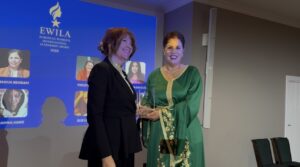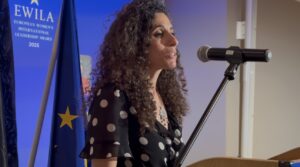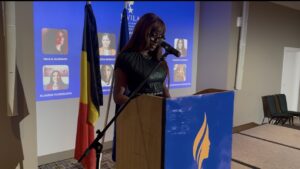Brussels Celebrates Women of Change: Eight Global Leaders Honored at the 2025 Women’s International Leadership Awards
Majdi Fatima Zahra
At the heart of the European capital, Brussels came alive on November 3, 2025, with a celebration of courage, vision, and transformation. Eight women from across the globe were honored for their leadership, resilience, and their ability to inspire change in their communities. The event, organized by the International Women’s Leadership Forum, marked the 7th edition of the European Women’s International Leadership Award — an annual gathering that has become a landmark occasion for those who believe in inclusive and visionary leadership.

In a warm and inspiring atmosphere, diplomats, European officials, members of parliament, and civil society figures gathered to pay tribute to women who have chosen to chart their own course — breaking away from conventional models to amplify the voices of those who have long remained unheard.
A Celebration of Hope and Exemplarity
The ceremony, which blended European formality with human warmth, stood as a powerful reminder that leadership is not defined by gender but by impact.

In his opening address, Radouan Bachiri, founder and president of the International Women’s Leadership Forum, emphasized that the award “honors women who have succeeded in transforming personal commitment into collective action — whether in politics, the economy, or civil society.”
“In a world marked by wars, climate crises, and deepening social divides,” Bachiri stated, “it is impossible to speak of sustainable development without promoting strong, inclusive, and diverse female leadership.”

He also underlined the urgency of breaking stereotypes and dismantling barriers that continue to limit women’s participation in public life.
“Women are often the first victims of crises — but they are also the first to invent solutions. Empowering them to act, innovate, and decide is not a choice, it is a necessity.”
Eight Women, Eight Journeys of Transformation
The evening showcased eight exceptional women — eight distinct paths united by one shared vision: the will to lead, to create, and to change.

Najlaa Chami (Yemen), Khadija Bendam (Morocco), Violeta Bulc (Slovenia), Nasancia Charles (Jamaica), Klaudia Fliegelova (Slovakia), Rahwa Kinfe (Ethiopia), Elis Lovric (Australia), and Christine Schuler-Deschryver (Congo) were celebrated as agents of progress in their respective fields.
Their recognition goes far beyond symbolism — it reaffirms the central role women play in building fairer, more balanced societies. Each laureate embodies a new generation of leaders who are not afraid to challenge norms, take responsibility, and redefine the contours of power.
A Distinguished Diplomatic and European Presence
The event drew a distinguished audience, including Members of the European Parliament, senior officials from the European Commission, ambassadors accredited to Belgium, and numerous representatives of the media and civil society.

The ceremony’s success reflected a shared conviction, that recognizing female leadership within Europe’s institutional landscape is not an act of benevolence but a political and social imperative. As one EU official noted, “the success of women in leadership is no longer an exception — it is the standard of progress itself.”
A Universal Message Beyond Celebration
In closing, the organizers reminded the audience that the Women’s International Leadership Award is far more than a ceremonial event — it is a global platform for amplifying women’s voices across all sectors, from public policy and science to business and grassroots activism.
“Celebrating women’s leadership,” declared the Forum’s final statement, “is to celebrate humanity’s capacity for renewal. The world of tomorrow can only be built with two voices — women and men — united in a shared vision of equity and progress.”
Analysis: From Recognition to Transformation
By honoring women from diverse backgrounds, Brussels sent a clear message to the world , leadership has no gender, only vision. In an era of uncertainty — marked by geopolitical instability, climate anxiety, and growing inequality — the rise of female leadership is not a question of identity politics; it is a question of governance and survival.
These women are not seeking recognition — they are transforming recognition into action. Their stories remind us that the future of leadership will not be written by those who hold power, but by those who redefine it with courage, empathy, and purpose.

